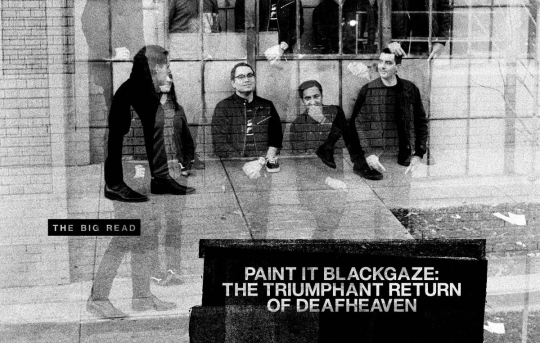Feature by Tom Connick via NME
With ‘Ordinary Corrupt Human Love’, California’s Deafheaven have released one of the most acclaimed albums of the year, a record that makes non-metal fans sit back and think, ‘Wait, do I like metal?’ Tom Connick finds them – surfing, no less – on the day of the album’s release.
Kerry McCoy spent the morning surfing. The black-haired, bespectacled metalhead might not look like the archetypal surf bro, but McCoy uses the waves as an escape fairly often. Today, the guitarist took to the board to get away from his own record – Deafheaven’s ‘Ordinary Corrupt Human Love’, which, when we speak, has been streaming online pre-release for a matter of hours.
“I’ve been trying not to look,” he says of the online reaction to the record. After his time on the sea, he went to hang out with friends – now he’s back home, ignoring his phone as much as possible. “My mom is keeping me updated,” Kerry says – he laughs when I suggest she might be filtering out any negativity.
Any longtime Deafheaven fan will appreciate his apprehension. Since their 2013 breakthrough, the Californian metallers – completed by vocalist George Clarke, guitarist Shiv Mehra, bassist Chris Johnson and see-him-to-believe-it mega-talent drummer Dan Tracy – have courted critical acclaim and genre purist backlash like few others. Second record ‘Sunbather’, released in 2013, was a beautiful fusion of post-rock atmospherics and doomy, heavy aggression, which achieved metal’s most elusive feat – crossover success. Heralded as genius by critics across the globe, this small-time, seemingly niche prospect soon found themselves performing at mainstream festivals like Coachella, and – according to reviews aggregate Metacritic – producing the year’s most critically acclaimed record, beating the likes of Beyoncé‘s self-titled, Kanye West‘s ‘Yeezus’, Daft Punk‘s ‘Random Access Memories’ and countless others to the top spot.
With breakthrough success, though, came underground backlash. Black metal purists turned their noses up at Deafheaven, pinning them as culture vultures after a quick buck. They hadn’t paid their dues, spewed the forums, all while Deafheaven’s stature continued to rise. Their sonic fusions irritated the blacker-than-thou, too. “A lot of people have this idea that we’re thumbing our nose at the metal diehards,” says Kerry, “and it’s never that. It’s really just that we want to be this kind of band.”
The fact they were pinned as metal saviors by some corners of the press was “overwhelming”, Kerry admits. Reviewed and written about by critics who’d never delved into the world of atmospheric metal before, they soon became tagged with all kinds of statements – ones they never wanted to make themselves. “You got people that either like, just really liked Beach House and had in no way ever listened to metal, but were like, ‘This is the most original thing I’ve ever heard in my entire life, this is god’s gift to music, oh my god’, and then there were people where all they listen to is Mortuary Drape, or they’re on the Nuclear War Now! Forums like, ‘This band is wildly unoriginal and the original thing that they’re ripping off sucks – this is the worst thing that could possibly happen to music’,” Kerry explains. “Both of those people were wrong!”
Citing the likes of ColdWorld and Alcest as early inspirations, he’s keen to drive home that Deafheaven never thought they were reinventing any wheels. “You’re getting blamed for stuff that you didn’t write, or you didn’t say, or whatever,” he shrugs. “People are gonna say what they’re gonna say, and they’ll like it or they won’t. Either way, we tried our hardest. That’s a mature way of thinking about it that I have now, but I think at the time we were trying to get to that point… hence my mom texting me stuff about the record, rather than me looking at it.
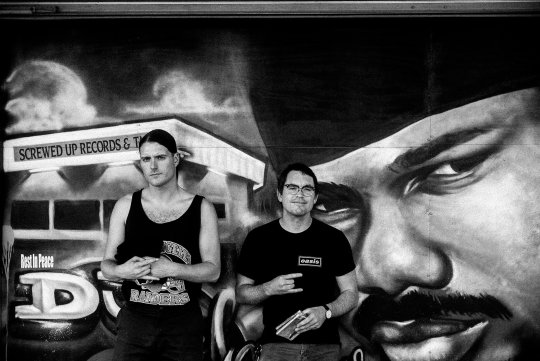

Photo credit: Sean Stout
‘Ordinary Corrupt Human Love’ is a record many will have to hear to believe. A swarming, euphoric mass of metal extremity, huge post-rock, Britpop melodies and guitar solos that could slot into place on a Thin Lizzy record, it’s a record that could soundtrack both victory marches and funerals – at once beautiful and bleak. “We’re all dudes that like extreme metal – really heavy, ridiculous stuff – but then we’re all dudes that really like psych-rock and shoegaze, Britpop, Madchester… Everyone in the band listens to everything,” explains Kerry of that anything-goes musical approach. No idea is considered too outlandish in the writing process, he explains: “If we like it, it goes in there – I think that’s how we end up with things like ‘Night People’ on the record, which is more like Portishead or The xx than anything else.
The main thing that stops it sinking into those more atmospheric indie passages is George’s banshee vocal. A death metal-like scream that could shatter your grandma’s spine, it adds an element not often found in records this sonically beautiful. “I think that the juxtaposition between the harsh vocal and the more melodic parts of the songs is cool,” says George, matter-of-factly. “I think that my voice, more than anything, provides a lot of texture to the music. I think that its main process is to provide texture, which I think is a little bit different to how vocals are normally approached.” It’s a method which sees George’s vocal used as much like a musical instrument as it is a means to deliver a story – though that vicious scream hides poetry worthy of its own publication. “I think that – while it can be a little difficult for some to hear – it’s an integral part of the band,” George continues. “It’s necessary to do.”
Fusing all those elements is often a case of trial-and-error. When it came time to approach ‘Ordinary Corupt Human Love’, the band exchanged voice notes and iPhone memos for months, before entering the practise studio last October. Picking out various riffs and piano parts that they’d demoed, and noodling over the top of each other, Kerry and Shiv began constructing what would become Deafheaven’s fourth full-length, almost by accident. “That happens a lot,” Kerry admits, “I’ll be playing this weird riff, just messing with it, and Shiv will just jump on top of it with something he’s making up on the fly, and we’ll be like, ‘Stop… that’s the thing. Don’t change that – that’s it right there’.”
Your music taste stems from a pretty British indie background – Oasis are one of your favourite bands, right?
Kerry: Yeah, definitely. Shiv is really into that too – we’re both large Manchester fans. I’m more of like a hooks, Beatles-y kinda guy, and he’s more of a Pink Floyd-y, psychy kinda guy. When we put that together, it comes out with this weird thing. For me, I can hear all of those things. I feel like it’s a… I don’t know what else to really compare it to, and I don’t mean to compare myself to this band, but I’d imagine this is how Thom and Jonny from Radiohead feel. There’s a really cohesive thing, where both of their separate influences gel together really nicely – that’s how I feel about Shiv. We’re both really good at separate things, and those things come together really nicely.
Is it nice to find someone that you can gel with like that – if you’re mixing together loads of different influences, it can go disastrously, sometimes.
Kerry: Absolutely. [laughs] And especially with Chris – he’s by far the most musical of any bassist we’ve ever had, and then Dan’s drumming, I think, just speaks for itself. I’m yet to meet another person who can play drums like him.
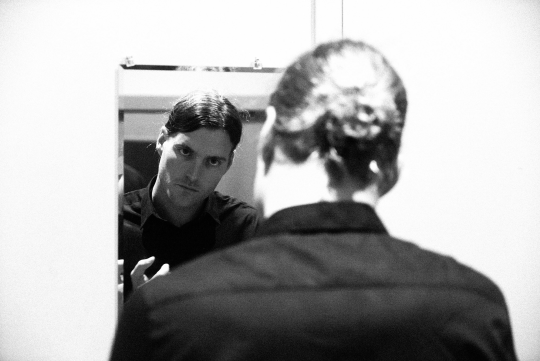

Photo credit: Sean Stout
That adulation is core to Deafheaven’s being. Now steadfast in their line-up after a bunch of early-days personnel changes, their trust runs deep. Kerry and George – ostensibly Deafheaven’s central duo – met at 14, drawn together in the kind of teen movie fashion only outcast kids at an American high-school could really muster. “I saw George at school – he was this new kid and he had a Slayer shirt on,” Kerry explains. “I went over to him and complimented him on his Slayer shirt, and I had a Dead Kennedys back patch and he was like, ‘Cool patch!’. The rest is history,” he peels off with a laugh.
“I feel very fortunate to have that relationship,” says George more solemnly. “Most people go into these great adventures alone, and it’s been nice not having to do that.
”Off the back of ‘Sunbather’’s acclaim, 2015 follow-up ‘New Bermuda’ was a much darker prospect, stripping out much of the beauty that made ‘Sunbather’ so accessible to those outside of metal’s four walls. Rather than a sonic mission statement, the shift was a reflection of the impact that explosion of interest had on the band. “It was just exhausting,” says George today. “We didn’t really have a break between ‘Sunbather’ and ‘New Bermuda’, and we essentially – in terms of recording and touring – just merged those two together. By the time that we were done recording that record, we were a little bit jaded, and definitely in need of a break.”
Kerry agrees: “’New Bermuda’ was a very big reaction – when I listen to that record I can feel the stress in it – it sounds like five guys who have their insides all wound up.” The result was a record which revelled in self-hatred.
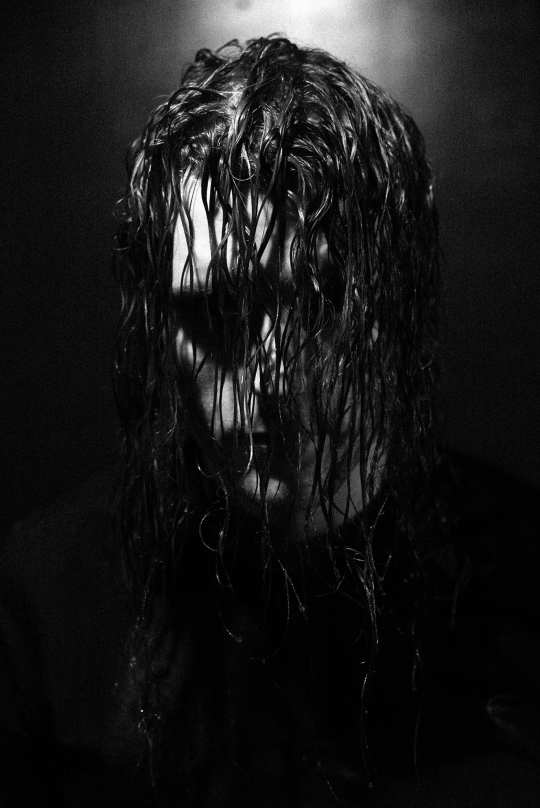
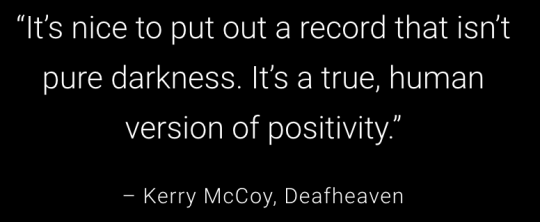
Photo Credit: Sean Stout
Was that darkness on ‘New Bermuda’ a reaction to the way ‘Sunbather’ exploded? You just got thrown into this, what I expect was, quite an unexpected success.
George: Yeah. That’s exactly it – with ‘Sunbather’ we found an opportunity to live off our music, and then we started living off our music, and then we got really scared of not being able to do that. We just kept going – we didn’t want to take any breaks. It was great – we did a tonne of extremely cool things – but it also took a bit of… a bit of a toll.
Growing up in that metal community, too, you don’t ever expect to have that kind of crossover success. It’s not really the done thing – it’s not something you’re prepared for.
George: Yeah, I think so. We’re flying this ship blindly, is how I like to describe it. Everything that we were embarking on then – and even still now – a lot of the time, is unfamiliar territory. We navigate it as best we can. It is interesting being this sort of ‘crossover’ metal act, because there comes pressure from both sides, in a way.
The Deafheaven of 2018 harbour a far more positive view of that crossover appeal – in fact, with the demons of the ‘New Bermuda’ cycle now behind them, ‘Ordinary Corrupt Human Love’ is an altogether more positive prospect all round. “If we’re your gateway into this beautiful form of music, then I think that’s win-win for everybody,” shrugs Kerry.
“I feel like when I was a kid, there was a hard line between being into alternative music and alternative things – especially aggressive music and aggressive things – and being a regular guy,” Kerry continues. “What I kinda see happening is that those lines are getting blurred. Some of these kids, these high-school kids, it’s not a big thing. They’re listening to the new Drake record or whatever, and then they’ll have Code Orange or Power Trip on next. From what I’ve seen, it’s not even really being talked about anymore – it’s kinda generally accepted that everyone needs to have a diverse music diet. I think that there’s a lot of bands out there that are helping open those doors, and I hope we’re one of them. More than it’s bands that are doing it, I think it’s just kids are smarter now than when I was in high school,” he breaks off with a laugh: “I remember it sucked being the punk kid in high school, when I was there.”
‘Ordinary Corrupt Human Love’, then, feels like a victory lap. It’s an escape from numerous dark pasts – one that finds Deafheaven rejuvenated. “It’s definitely a cathartic record,” Kerry agrees. “To me it sounds like five dudes who have, essentially, been holding their breath for about five years [laughs]. We’re finally taking a deep breath and relaxing a little bit, instead of trying to handle things in a negative way. I think you can definitely hear that on it.” It’s a record which doesn’t shy away from the grisly truth of that path to redemption, though – for every soaring, reflective moment of musical bliss, there’s a doomy scream, or a well-timed lyrical takedown, to bring things back to reality – for every ‘You Without End’, on which George sings of being “In a dark tunnel / And new dawn approaching / With a sphere of light / Ever glowing”, there’s a ‘Honeycomb’, which finds him declaring that “My love is a bulging, blue-faced fool / Hung from the throat by sunflower stems.”
“If I’m going to be spending time making art, or spending time writing lyrics or writing music, I think it’s important just to be honest,” says George. “I think it’s a waste of time if I’m not honest, and in being honest one has to reflect on both the positive and negative aspects of life. I think we try and do that – we try and be well-rounded about our reflections on life, and take the good with the bad, and not shun away the darker side of things. We try and be as accurate a representation of our feelings as possible.”
“I think that, where the world is at now… I know I’m in desperate need of some positivity these days,” says Kerry. “It is nice to be out there and put out a record that isn’t literally pure darkness. It’s almost like a true, human version of positivity – it’s flawed positivity, like: ‘Hey, no one’s perfect here – but we’re all gonna end up alright’.
”Deafheaven’s new album ‘Ordinary Corrupt Human Love’ is out now via ANTI- Records.

